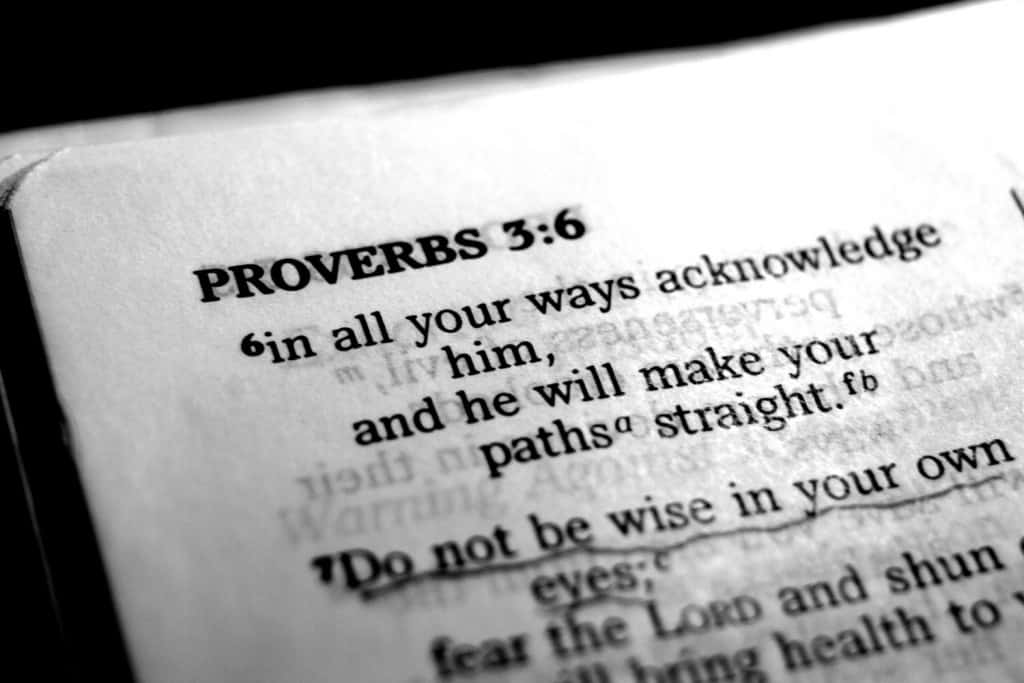A Simple New Year’s Goal (Proverbs 3:5-6)

Big Idea: Begin the year with helpless dependence upon God, and he’ll look after the rest.
Happy New Year! I have a very simple proposal for you today. I want to set a goal with you for the coming year. I don’t care if you’re the type of person who’s already given up on New Year’s Resolutions. This is for you. I don’t care if you’ve failed at every New Year’s Resolution you’ve ever set. We need to set this goal together, and I want you to do it with me.
Here’s the great news: this goal doesn’t require willpower or discipline. In fact, it requires the opposite. It requires that we admit that we don’t have what it takes, that we don’t know what to do, and that we’re going to fail more times than not. This is a New Year’s goal for those of us who’ve tried to make life work on our own, and have failed. It’s a goal for people like you and me.
What’s the goal? It’s simple. We just read it:
Trust in the LORD with all your heart, and do not lean on your own understanding. In all your ways acknowledge him, and he will make straight your paths. (Proverbs 3:5-6)
Let’s look together at the goal, and then let’s look at what we’re promised when we do this.
The Goal
Our goal is to fully trust in the Lord, avoid relying on our own understanding, and acknowledge Him in everything we do.
At first, this sounds like a lot of work. It sounds like something we have to add to what we’re already doing. On top of work, family, friends, and church, now add a complete trust in God to what you’re doing. If that’s what this passage tells us, then we’re doomed. We’re just not going to succeed in adding something else to our lives.
What Proverbs asks us to do, though, isn’t to add something else to our lives. It asks us to do the exact opposite: to surrender everything in our lives. Rather than carrying more, this passage asks us to carry less. It asks us to lay everything down. You can go into 2017 lighter than ever. You can leave today having released all the burdens you’ve carried into the New Year and into this place.
What does it mean to trust? G. R. Driver argues that the Hebrew word for trust had originally the idea of lying helplessly face downwards. It’s a picture of total surrender and helplessness. I love how Ray Ortlund puts it. It means:
…to throw oneself down on one’s face, to lie down spread-eagle in complete reliance—to make it as graphic as I can, to do a belly-flop on God with all our sin and all our failure and all our fears. We stake everything on the gospel promises of God. If God fails us, we are damned. If God comes through, we are saved forever. Real trust is that blunt and daring and simple.
This is so counter to the way we normally operate! I’ve been getting some physiotherapy lately. It’s not always a lot of fun. Sometimes the physiotherapist has been working on me, and she says, “Okay, relax your leg. Let me do all the work.” I try to relax, and a minute later she tells me to relax. It turns out that surrendering control is a hard thing to do.
The same applies to our relationship with God. We are so used to making things work that the idea of lying down in complete reliance on God, bringing all of our sins, failures, and fears terrifies us. Who wants to do this? But it’s exactly what all of us need. In his excellent book A Praying Life, Paul Miller talks about the importance of helplessness. Children are really good at helplessness, he says. The problem is that adults are really bad at being helpless.
I, for one, am allergic to helplessness. I don’t like it. I want a plan, an idea, or maybe a friend to listen to my problem. This is how I instinctively approach everything because I am confident in my own abilities…God wants us to come to him empty-handed, weary, and heavy-laden. Instinctively we want to get rid of our helplessness before we come to God… The gospel, God’s free gift of grace in Jesus, only works when we realize we don’t have it all together. The same is true for prayer. The very thing we are allergic to—our helplessness—is what makes prayer work. It works because we are helpless. We can’t do life on our own.
The greatest gift we can receive today is helplessness: to realize that we can’t do life on our own. So let’s do what this passage says and do a belly-flop on God. Let’s come completely helpless before him today and tell him how desperately we need him if there’s any chance of making life work. We can’t do it apart from him.
This passage tells us how exactly we’re supposed to do this in two ways:
- Do it wholeheartedly. It says to trust God with all your heart. A seminary professor told about his father crossing the Susquehanna River one winter’s day. His dad didn’t know how thick the ice was, so he was crawling along on all fours, gingerly feeling his way forward. Then he heard some racket and clatter coming up behind him. He looked back, and here came a wagon pulled by four horses, and the driver was whipping them along at a pretty good clip right across the frozen river. The guy was a local. He knew how thick the ice was. Ortlund comments, “Too many Christians are like the man down on all fours, creeping along, way too cautious. Their trust in the Lord is halfhearted. Then along comes a wholehearted Christian, and he changes the tone for everyone around.” Don’t approach God timidly. Trust in him with all your heart. Hand everything over to him. He can handle it. You can put the full weight of your life in his hands.
- Do it exhaustively. Leave nothing out. It says “in all your ways.” God isn’t asking you to trust him with part of your life. He wants all of it. He wants everything that shames you, everything that makes you afraid, everything you’re struggling with. He wants all of it. He wants your total self: your work, your worries, your relationships, your doubts, and your fears. Hold nothing back. The very things you’re tempted to hold back are the very things that you need to surrender to him today.
And so I charge you today: as we enter a New Year, let’s begin by trusting God with all of our lives. Let’s begin with an attitude of complete helplessness before him. Let’s decide right now that we can’t make it even a day into the New Year if he doesn’t help us. Let’s become like children and put our complete trust and faith in our Heavenly Father. I know that I need to do this, and you need to do it too.
What We’re Promised
What are we promised if we do this? Proverbs 3:6 says that if we do this, he will make our paths straight. What does this mean? It doesn’t mean that everything in our life will go smoothly. That clearly isn’t the case. It does mean that out of the mess of our lives, with all its twists and turns, God will create something beautiful. he will lead us to his desired goal for us. A Portuguese proverb says, “God writes straight with crooked lines.” He will take the crooked lines of your life, and looking back you will see that he used these crooked lines as the most direct path to get you exactly to where you needed to go.
We often say these words together from the Heidelberg Catechism when we confess our faith:
He also preserves me in such a way
that without the will of my Heavenly Father
not a hair can fall from my head;
indeed, all things must work together
for my salvation.
We have no promise that all the bad things in life will go away. We do have the promise that God will be at work in every detail of our lives to accomplish his purposes for us.
So today, let’s begin with this goal. The goal is simple: Let’s acknowledge that we don’t have what it takes to make our lives work. Let’s put the entire weight of our lives on him right now: all of our stresses, fears, sins, and shame. Let’s not do it timidly. Give him everything. And let’s know that as we do so, he will be at work in our lives. He will use every detail to accomplish his purposes for us.
Are you with me? Let’s pray right now and do this.





